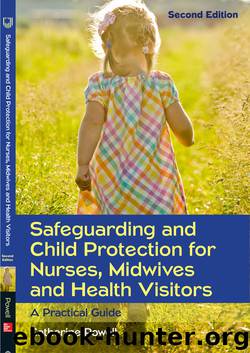Safeguarding And Child Protection For Nurses, Midwives And Health Visitors: A Practical Guide by Powell Catherine

Author:Powell, Catherine [Powell, Catherine]
Format: epub
Publisher: Open International Publishing Limited
The effects of child sexual abuse
Not surprisingly, child sexual abuse can have a serious and enduring impact on the physical, emotional and sexual health of individuals across their lifespan. Horvath et al. (2014) report findings of long-term profound psychological damage, with short-term damage likely, but often hidden, due to a lack of disclosure at the time of experiencing the maltreatment.
Myers et al. (2002) provide a detailed summary of the research findings on the effects of child sexual abuse. They suggest that two decades of research into the outcomes for those who have been sexually abused as children has found a ‘wide range of psychological and interpersonal problems’ (p. 59). The authors link their findings to the fact that this form of abuse is frightening, painful and confusing, and that it induces shame and bewilderment. Fundamentally, the authors propose that sexual abuse leads to responses in childhood that interfere with normal developmental processes and they summarize the effects on children and young people in terms of causing emotional distress and dysfunction, post-traumatic stress, behavioural problems, interpersonal consequences and cognitive difficulties. However, they do acknowledge that much of the research that they reviewed concerned clinical, rather than population, samples and thus may not be generalizable. Myers et al. also report on a number of studies that have considered the longer term outcomes for children who have been sexually abused and found that these include depression, suicidal tendencies, anxiety, poor relationships, running away from home, substance misuse, eating disorders, abnormal sexual behaviour and poor achievement at school, adding that many of these difficulties will persist into adulthood. It is thus very likely that adult survivors of sexual abuse will feature within patient and client groups in a variety of settings, including adult mental health services. Nurses and midwives thus need to be open, responsive and compassionate and know how to access additional support for this group of people (see Chapter 9).
Finally, it is worth concluding this section with a more optimistic finding on the apparently common concern that there is a high risk of those who were sexually abused as children becoming perpetrators themselves in their adult life. This is not necessarily the case (Horvath et al. 2014) and a consistent message for practice is that timely and responsive interventions to child sexual abuse that promote emotional and cognitive resolution may improve the chances of a positive outcome in later life.
Practice question
Given the evidence that suggests that the reactions of practitioners to a child or young person who discloses sexual abuse have an impact on the child’s ability to cope, how can you ensure that you (and members of your team) are receptive, believing and responsive to the need for protection of children who have been sexually abused?
Download
This site does not store any files on its server. We only index and link to content provided by other sites. Please contact the content providers to delete copyright contents if any and email us, we'll remove relevant links or contents immediately.
The Art of Coaching by Elena Aguilar(52199)
Thinking, Fast and Slow by Kahneman Daniel(11800)
The Art of Thinking Clearly by Rolf Dobelli(9921)
The 5 Love Languages: The Secret to Love That Lasts by Gary Chapman(9290)
Mindhunter: Inside the FBI's Elite Serial Crime Unit by John E. Douglas & Mark Olshaker(8707)
When Breath Becomes Air by Paul Kalanithi(8042)
Periodization Training for Sports by Tudor Bompa(7929)
Becoming Supernatural by Dr. Joe Dispenza(7842)
Turbulence by E. J. Noyes(7707)
Bodyweight Strength Training by Jay Cardiello(7680)
Therapeutic Modalities for Musculoskeletal Injuries, 4E by Craig R. Denegar & Ethan Saliba & Susan Saliba(7601)
The Road Less Traveled by M. Scott Peck(7282)
Nudge - Improving Decisions about Health, Wealth, and Happiness by Thaler Sunstein(7248)
Mastermind: How to Think Like Sherlock Holmes by Maria Konnikova(6942)
Enlightenment Now: The Case for Reason, Science, Humanism, and Progress by Steven Pinker(6877)
Win Bigly by Scott Adams(6831)
Kaplan MCAT General Chemistry Review by Kaplan(6601)
Why We Sleep: Unlocking the Power of Sleep and Dreams by Matthew Walker(6362)
The Way of Zen by Alan W. Watts(6290)
